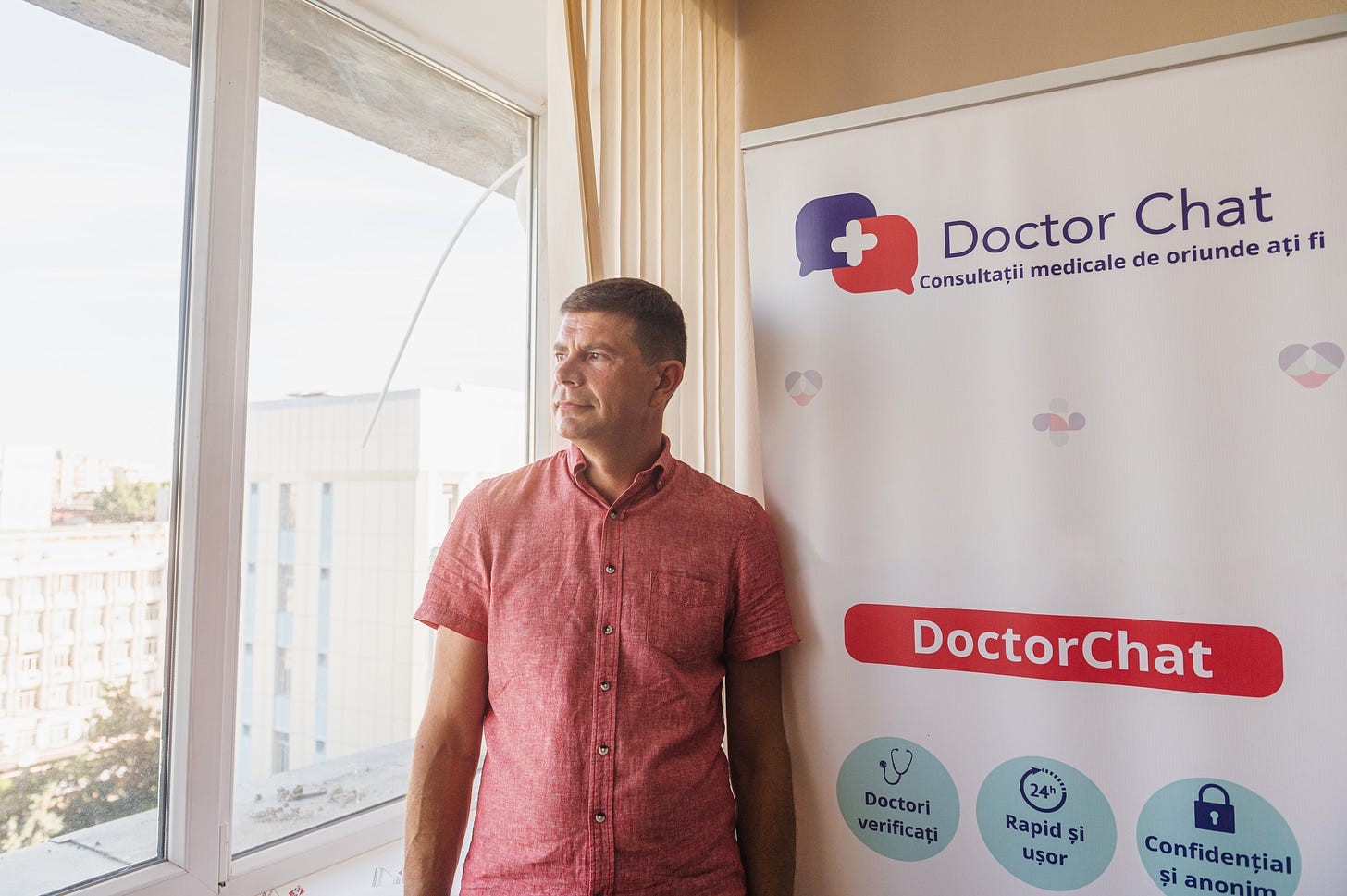This story was written by Djein Vacari of the Journo Birds, a media team that works withnonprofits to tell human-centered stories. This story was supported by UMAEF.
When an allergy left my eyes red, swollen, and stinging, I refused to wait days for an appointment. Instead, I turned to a Moldovan telemedicine app and received a treatment plan within hours.
It was a late‑May morning, one of those days when you already feel the summer heat rising, planting in you great expectations, when I woke up with red, swollen, stinging eyes. Allergic reaction? Definitely, though I looked more like I’d partied all week. Knowing I had a friend who suffered from ragweed allergy every year, I asked her to recommend a specialist.
I Googled her name and the first result was Doctorchat, a Moldovan telemedicine platform launched five years ago. Rather than wait three days in‑office, rubbing my eyes nonstop and watching the downfall of my self‑esteem, I opted for the app, detailed my symptoms, treatments, skincare routine, and sent three gruesome eye selfies. Three hours later, I had a complete set of instructions.
Doctorchat is run by a three-person team offering an alternative to traditional care. Today, about 200 doctors use Doctorchat, none of whom needed convincing to join, since the digital format didn’t scare them.
It started with simple chat consultations. Now you can also book video calls or in-person visits. But all options, even the written ones, are handled by licensed specialists. Once you choose a doctor, they are available for 24 hours to answer follow-ups.
Real doctors treat real cases, even from abroad
Emilia Stici, a gynecologist‑endocrinologist with over 30 years of experience, has been on Doctorchat almost since its launch. “My consultation on the platform is identical to what I offer in the clinic,” she says. “Usually, 30 minutes is enough to answer all questions and give recommendations.”
I was surprised to learn that many of her cases are urgent, with heavy bleeding or acute inflammation, and often involve women from the Moldovan diaspora in places like the UK or Ireland, where healthcare access might be difficult and language barriers persist.
Doctorchat began with an idea during the pandemic. Veaceslav Culev is a man over forty, far from the stereotypical image of an IT entrepreneur, and that’s no coincidence. By training, he’s a physician. After graduating, he joined a German-Italian pharmaceutical company, where working with healthcare professionals at every level helped him build the network for his later video‑chat platform.
“The pandemic changed our daily lives, and that’s when I thought of facilitating access to medical services. I started this project with my savings, then received support from individuals and organizations like Mozaic1 and a public institution, supporting Moldovan small businesses,” Culev recalls.
Doctorchat is just one example of how digital health is developing in Moldova. Other projects include Selftalk, a self-therapy app focused on managing stress and anxiety through guided audio sessions, and Easyplan, a cloud-based software designed to streamline dental practice operations, where Culev also serves as CEO. At this stage in Moldova, around 10% of startups are in the field of digital health.

Digital health is growing, but still fragile
This rise in HealthTech mirrors global trends. In 2020, the World Health Organization adopted its Global Strategy on Digital Health for 2020–2025 to improve health outcomes through technology. At home, a strategic alliance between the Moldovan Association of ICT Companies and the Nicolae Testemițanu State University of Medicine and Pharmacy, supported by Technovator and Startup Moldova, has driven the annual Digital Health Forum and nurtured this active ecosystem. Being included on the ECHAlliance platform not only acknowledges these advances but also connects Moldova to a global network of HealthTech leaders.
Yet, according to Mihai Dascăl, President of the We4Health Association, professor, innovator, with a background in medicine, the Ministry’s commitment to digitalizing healthcare is still not strongly felt, even though it officially supports the idea. He does acknowledge, however, that integrating the e‑retete system2 for which he was the technical architect, is a major improvement for Moldova’s healthcare services. Together with the National Health Insurance Company, his team built a system now used by doctors and pharmacists across the country.
On the other hand, support from Moldova Innovation Technology Park (MITP) and Startup Moldova is more visible, though not without gaps. “Startup Moldova has done an excellent job of guiding and funding early‑stage initiatives,” Dascăl notes, “but this field is very specific. It needs an organization fully dedicated to this vertical, one that understands the life cycle of a medical startup,” Dascăl explains. “As for MITP, it supports HealthTech startups focused on software or IT development, but there’s a limitation: only companies whose main activity falls under specific IT-related codes can become residents. This makes it difficult for startups that rely on non-programmer specialists — like biologists or clinical engineers — to fully benefit from the program”

Linking European and post-Soviet medical traditions
According to Culev, the 30 percent client return rate gives Doctorchat the confidence to roll out business‑to‑business services, integrate AI tools, and grow the Romanian version of the platform. He believes Moldova has the potential to link European and post-Soviet medical traditions, thanks to its highly skilled doctors.
Building on that vision of local expertise and innovation, Dascăl emphasizes that Moldova’s medical community already has the skills and drive needed. “We have talented people with a lot of potential,” he notes, explaining that a structured framework is missing. He proposes a centralized hub where startups, academic institutions, and the Ministry of Health can collaborate efficiently.
Like reading Moldova Matters but having trouble finding time to keep up? Download that Substack app and you can listen to articles while you walk to work, wash the dishes or whenever you prefer a podcast to a long article!
An investor syndicate supporting Moldovan tech startups
The national electronic prescription platform in Moldova



